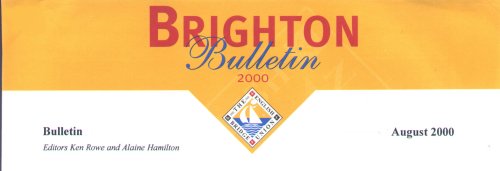|
|
|
|
|
|
![]()

![]()
Following a change in approach at World Bridge Federation level, it was decided to give Tournament Directors some powers previously only available to Appeals Committees. This involved Law 12C3, which means that when the Director assigns a score after something has gone wrong (for example after a mis-explanation has damaged opponents) rather than give the non-offenders the best score they might possibly have got (which is sometimes a very harsh ruling), he can now give a weighted score, ie a percentage of one score and a percentage of another. In England this has been permitted since August 1st .
To make it clearer, here is an example from the first match last night.
| West | North | East | South |
| 1 | 1 | ||
| Dbl | 2 | 2 | 2 |
| 2NT | Pass | 3 | All Pass |
| Result: 3 | |||
| Match 1 Board 6 Dealer East E/W Vul |
||
|
|
||
Double showed hearts, and 2NT was a natural game try. Unfortunately East described it differently, and South did not realise West had a balanced hand. He felt he might have doubled if he had.
South was certainly misinformed, so how should the TD, John Probst, adjust it? He felt that a double by South was far from certain anyway (somewhere between 1 time in 4 and 1 time in 6), and eventually gave a weighted score of 3![]() doubled - 2 one quarter of the time,
3
doubled - 2 one quarter of the time,
3![]() - 2 the rest of the time. This feels fairer than giving South nothing, or awarding him the full effects of a double that he might or might not have made. Players seem to find this type of ruling very fair.
- 2 the rest of the time. This feels fairer than giving South nothing, or awarding him the full effects of a double that he might or might not have made. Players seem to find this type of ruling very fair.
![]()
![]() Editor's note:
Editor's note:
![]()
|
|
|
|
|
|
|
| Last article |
Laws menu |
Main index |
Top of article |
Local menu |
Next article |